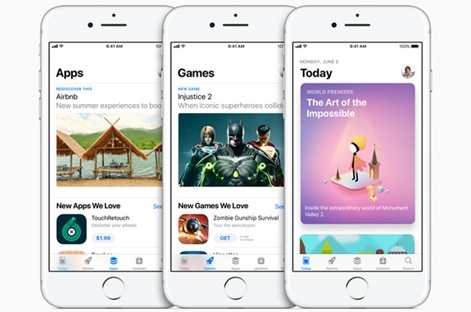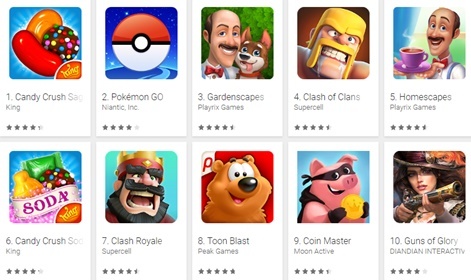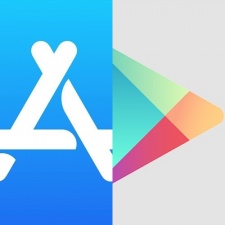Since the dawn of the App Store, Apple and Google have adopted the 70/30 revenue share, with 70 per cent of sales going to developers and the rest going into the platform holders' coffers.
More recently, Facebook Instant Games on Android adopts the same revenue share after Google Play's, leaving developers with a minority share in revenue (49 per cent). Google and Apple have meanwhile already cut their revenue share for subscriptions after one year to 85/15.
Epic recently adopted an 88/12 revenue split on the Unreal Marketplace (though that deals with assets rather than apps and games).
But with mobile marketplaces making billions of dollars a year, and Apple now worth $1 trillion, is it time for a change to the terms?
Our contributing editor Jon Jordan recently said why he thinks the current model may be doomed. We thought we'd take the question to our Mobile Mavens, specifically asking:
Do you think the 70/30 model still works and is fair for what platform holders provide?
If you'd like to see change, what would you like to see happen?
In Jon’s article, the better than 70 per cent examples are all where developers can direct sell to consumers.
What incentive do Apple and Google have to reduce their margin? Would it draw more developers? I doubt it. Maybe this move would make sense for an Amazon or low traffic third-party stores as an incentive.
I think Apple and Google deserve their 30 per cent. We owe a lot to them and they do a great job on improving the store in my honest opinion.

Adam has been in the mobile game industry since 2007, creating games independently. He's since grown into a full 50+ person studio manager.
Recently he's taken a position at Wooga in Berlin to sharpen his design skills and work with the world's best to create amazing, well-crafted products onto the mobile marketplace.
Unless there's a serious risk of a competitor coming in and stealing devs using a better share (which will not happen any time soon) I don't see Apple or Google budging.
Keep in mind for subscriptions, it only drops to 15 per cent after a user renews a yearly subscription. This incentivises developers to drive strong long-term retention which I think is a good model.
Facebook Instant Games is still an early marketplace, but negotiating with two platforms stacked on top of each other leads to the 49 per cent split.
Both Google and Facebook want a substantial cut to make it worthwhile for them. 49 per cent is similar to the WeChat messenger model as well.

Microsoft is on the back heel against Apple, Google and Steam. I think the split they have is to try to incentivise developers, but until there is a substantial user base it doesn't really create any pressure to Apple or Google.
Blockchain I'm not sure I can really comment on, but I doubt it will pressure Apple to change their policy.
The games for blockchain are still very early and are for a niche of users. We're not at the stage with a mass adoption of people having crypto wallets that they want to use in games.
Comparing with the revenue splits of publishing in places like China leaves me nostalgic for the days of Apple/Google terms.Devin Nambia
While the 70/30 split may seem steep given the risk profile of the app stores, comparing with the revenue splits of publishing in places like China leaves me nostalgic for the days of Apple/Google terms.
Certain large publishers in China will sometimes offer terms that skew much more in their own favour, which is tough for developers and can border on untenability for indies that generally get worse terms.
What Apple and Google demand is not all that bad, and the step-up share from subscriptions is a move in the right direction. On the flip side, it would be nice to see some better terms on things like consistent featuring to justify the revenue split.
Right now featuring is often a function of your BD relationship and whether Apple & Google like your game. Something more standard across the board would make the rev share a bit easier to stomach.
I know Partners which offered us even 100 per cent revenue share, but 100 per cent of nothing is still nothing. So many developers and publishers do not remember the time of operator/telcos which kept the dev with partly under five per cent of revenue share. Feeling old now!
Greed is always the end of a platform. Everyone needs to generate enough revenues and more important - profits. If a developer cannot be profitable anymore the market and the end consumers will suffer like in the old JavaME days.

And only shitty games will flood the market. Would I love to get a better revenue share? Of course, as I can invest that money in better games, hire more devs, more marketing, etcetera.
70/30 always feels good to me. It says, I the creator take home the lions share, but you the distributor have the incentive to help me sell my product.
As some of the other comments have mentioned, I don’t see this changing unless a strong and large competitor made a rival app store for Android and even then it would have to take a lot for Apple to change.
It’s also worth noting that of the 30 per cent, there are some fees associated with it that initially covered:
- Credit card processing fees (now very low around 0.1 per cent, but they used to be higher)
- Reporting, payments and refunds
- Distribution and server costs
- Store front, managers, events, training
- Promotions/affiliate scheme come out of the 30 per cent portion.
So being fair I’d probably assume it’s around 15 per cent profit to both companies. Still not half bad considering that’s on every single purchase.

John is co-founder of PR and marketing company Big Ideas Machine. Also an all-round nice guy...
It feels like we are comparing apples with oranges here.
Yes, the Epic announcement about the Unreal Marketplace is a great PR story (especially the fact that the new revenue share will be backdated to 2014) but this is a marketplace for game assets, and increased activity by creators in the marketplace improves the stickiness of Unreal Engine as a creative platform.
So this is nothing to do with fairness and everything to do with protecting market share.
Then we have the generosity of the Microsoft store, but not for games. Why? Because as a mobile ecosystem it is miles behind Apple and Google.
So unless consumers decide that a phone that runs Windows 10 is the new must-have accessory of the summer, all Microsoft can do is throw money at developers and hope that they have forgotten what happened with Windows Phone.

Suggesting that the Apple and Google 30 per cent is justified because it includes hosting, reporting and payment fees doesn't really work, as all the stores include such costs within the respective revenue share.
So we can only conclude that Apple and Google charge 30 per cent because they can and because it's an acceptable payoff for the incredible opportunity the leading app stores give to publishers.
It seems to me that UA costs are the real issue, but Apple and Google are the visible targets.John Ozimek
Could they drop it beneath 30 per cent? For sure - but why would they? Neither company wants to get into an arms race with the other (as if one dropped, the other would have to match it immediately), and both are making a tonne of cash, thanks very much. Plus, there is no effective competition putting revenue or market share pressure on them.
The real question is what the total opportunity cost is once you add in UA. Access to the world's biggest game-buying audience for a 30 per cent revenue share and no upfront distribution costs is an incredible deal - as long as you haven't already spent 70 per cent on installs and monetisation.
It seems to me that UA costs are the real issue, but Apple and Google are the visible targets.
Another vote for keeping the 70/30 split. Apple and Google take care of a huge hassle for us, and, in my opinion, they are worth their share.
The worry shouldn't really be the 70/30, the real issue is that the app stores seem to be increasingly engineered to require Google Ads or Apple SearchAds usage for any fair chance to gain momentum.
So if you are effectively paying for discoverability with the app store, the revenue share suddenly feels somewhat different.

Epic's Tim Sweeney has weighed in on this with his thoughts, with Fortnite bypassing Google Play. Now obviously Epic and Fortnite are their own special case (and who knows, maybe this won't work!), but Tim makes some interesting points about what Google offers on an open platform.
I think the revenue share starts becoming a bit rich when, as Richard says, you could end up giving more money to the platform holder to get your game noticed.
I think at the very least, for companies like Facebook that are currently releasing their platforms (like Instant Games on Messenger) on top of storefronts like Google Play, it doesn't make sense to take yet another 30 per cent cut.
That does not strike me as favourable for developers. (I should note Facebook has previously said it may not stay with the 70/30 split).
It's fascinating to see Epic rolling out their own Android store to distribute Fornite.
'Content is king', they say, so this bold move speaks volume to the value Epic feels it is getting for its 30 per cent and the power play at work here.

Epic believes Fortnite is so big right now that Android users will flock to its store to download it.
To Epic, discarding the 30 per cent cut is well worth the additional trouble of building their own infrastructure, losing visibility on Google Play and forcing players into another payment method. For such a big title as Fortnite, I think Epic is right.
As a result, I think we will see more publishers distribute their Android games directly in the future. In return, I wouldn't be surprised if both Apple and Google started diversifying their distribution service menu with reduced rates or additional offers such as paid promotion.
Meanwhile, Epic is off "pulling a Valve" and building its own Android version of Steam. Warm up your popcorn, this is going to be good.
Since the question is what I’d like to see and what I’d personally consider fair, here goes:
- A 30 per cent royalty is not justified on Google Play and the App Store when you compare it to Steam. The services Steam provides to games developers, from community forums to Steam Workshop, including the data hosting, are of significant value.
- Selling Search Ads is definitely at odds with taking a 30 per cent cut. Personally, I consider first-party controlled paid visibility something that belongs to the dark ages of Java games.
- How’s this for fair: the platform provider takes a 30 per cent cut for the installs it has driven and 10 per cent on the rest? Platform providers certainly track and know the installs generated by the front page feature slots.
I’m for 70/30. It’s easy to take platforms for granted, grass is always greener etcetera.
The more interesting development for me isn’t the platform cut, it’s the proliferation of game platforms we seem to be witnessing, in large part because some major publishers don’t want to pay any cut to a third-party distributor.
Activision, EA, now Bethesda on PC, Epic, there’ll be more.
Speculative: at what point does a King or Machine Zone-size business (or challenger thereto) think about that direction too?
How much distribution fragmentation in the name of individual game revenue maximisation would the market bear?






























